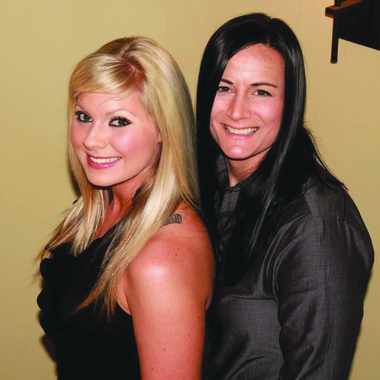Marriage Equality in the Bible Belt

By Ken Townsend and Robin Dorner
On May 17, 2004 the first marriage license in the U.S. was issued to a same sex couple in Massachusetts, but it wasn’t without opposition. Then Gov. Mitt Romney and state Republicans tried legislative and constitutional amendment tactics to overturn the Court’s decision. These efforts failed and the marriage equality was there to stay.
Now, nine U.S. states and the District of Columbia allow marriage between same-sex couples and even more recognize Domestic Partnerships. The most extreme opposition to marriage equality seems to come from the middle part of the country, known as the Bible Belt.
Influenced by its conservative, evangelistic roots, this mostly rural, Republican population seems easily influenced by messages of hate for gays, people of color, people of different religions, and people who are different, in general. These are also the least educated and poorest performing states in math and science according to 2012 test scores.
So, what about the LGBT couples who live in this region? How are they coping? These Bible Belt states have passed strict constitutional amendments against marriage equality. All of them are very red states and, short of changes in federal laws, the probability of marriage equality in this region is nil.
“We have decided to wait until it is legal. It is sad, but we would like to be married legally in front of our loved ones,” said Jennifer VanBurkleo who lives in Tulsa, OK with her partner Ashleigh (pictured below at right). “We have rings, matching tattoos, we just bought a home together, [we have] a joint account and are even looking to expand our family.”
Van Burkleo is originally from Wichita, KS. Both she and her partner have college degrees, they like to travel, they are active in their community, they volunteer at Oklahomans for Equality (OkEq), Tulsa Pride and other organizations where they give back to their community. Their story is not much different than any other American family.
Brad Murray and Jaime Rivera from Oklahoma City were married on October 1 2012, on Angels Bay Beach in Oahu Hawaii. While Hawaii is also a state not recognizing their nuptials, Murray said, “I just wanted a beach wedding and Hawaii is Jamie’s favorite place.”
Also from Tulsa and married in Tulsa on October 27th of this year are Jesse Lee Wilson III and Patrick French. They were married in a The Parish Church of St. Jerome in Tulsa. Where they know Oklahoma does not legally recognize their marriage, unlike VanBurkleo, they wanted a ceremony where they live and where their friends and family could attend.
And in the abyss of this biblical, anti-gay marriage, evangelical “gays are ruining the world” rhetoric, according to a 2011 report by 24/7 Wall St., Oklahoma has the highest divorce rate in the country. Arkansas is right behind the Sooner State with the second highest rate of divorce. In fact, Oklahoma’s own Governor Mary Fallin has been divorced as well as her daughter, Christina.
It appears the only chance for marriage equality in the Bible Belt lays in the interpretation of the Constitution of The United States. On December 7, 2012 the Supreme Court of the United States agreed to hear the cases from the lower courts regarding the constitutionality of DOMA and California’s Proposition 8. The ruling which is expected in June, 2013 may also affect the constitutionality of the constitutional amendments previously passed by the states banning marriage equality and whether or not states can prevent the marriage of same sex couples.
- May 17, 2004 - a Supreme Judicial Court of Massachusetts ruling in Goodridge v. Department of Public Health, Massachusetts became the first state to bring marriage equality to this country and the first marriage license to a same sex couple was issued
- Then Gov. Mitt Romney, pours millions of his own money into opposition. He and state Republicans try legislative and constitutional amendment tactics to overturn the Court’s decision. These efforts failed and the marriage equality was there to stay in Massachusetts.
- In state elections later that year, anti-gay forces led by Karl Rove were able to push through constitutional amendments in twelve states in a move to head off anticipated lawsuits against the anti-equality marriage laws.
- Also in 2004, Montana, Mississippi, Missouri, and Oregon limited marriage to other sex couples, but in Arkansas, Georgia, Kentucky, Michigan, North Dakota, Oklahoma, Ohio, and Utah, the amendments denied any form of family recognition or status, including civil unions and domestic partnerships.
- In the next two years Louisiana, Texas, Colorado, Idaho, South Carolina, South Dakota, Tennessee, Virginia, and Wisconsin pass constitutional amendments against same sex marriage. But then, the measure failed in Arizona. This marked a turning point as the courts and other legislatures begin to get involved.
- 2007, Eureka Springs, AR establishes the only Domestic Partnership Registry in the entire south-central region, despite a state law banning same-sex marriage.
- 2012, Democratic Party became the first major political party in the U.S. to endorse marriage equality, along with President Obama, who became the first sitting president to endorse marriage equality.
- Maine, Maryland and Washington pass constitutional amendments allowing marriage equality in the November, 2012 elections.
- Also on the 2012 ballot, gay marriage ban amendment defeated in Minnesota.
- November 2012, Eureka Springs, AR City Council becomes first city in Arkansas adopt a resolution to endorse marriage equality.
- December, 2012, Prop 8 in California is ruled unconstitutional by the California Supreme Court, DOMA is ruled unconstitutional by the United States First Circuit Court of Appeals.





